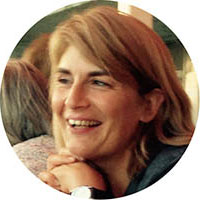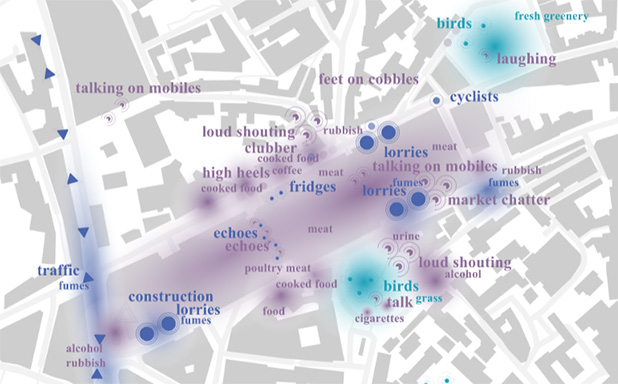Cities are increasingly branding themselves not by how they look, but by how they feel – although residents and visitors sense cities very differently depending on their tasks and needs, according to Brunel University London's Dr Monica Degen.

Dr Degen, a Reader in Cultural Sociology, was interviewed yesterday (10 January) on Thinking Allowed, BBC Radio 4's social science discussion programme, during an episode dedicated to the sensory landscape of the city.
Changing smells of the city
Laurie Taylor, the programme's host, was keen to hear about Sensory Smithfield: a project led by Dr Degen in which the sounds, smells and ambience of London's Smithfield Market are documented and brought to life in a series of interactive digital maps, for both now and throughout its 800-year history. "The smells would have been terrible," Laurie commented.
"Well, terrible depends, " said Dr Degen. "If you had lived at that time, you probably wouldn't have thought of them as terrible. And that really illustrated how the senses are not just biological perceptions, but really shaped by social judgements and cultural values."

Map from SensorySmithfield.com
But it's true that Smithfields nowadays, and cities more widely, are gentler on the senses. "It's become generally much more muted, and also a much more streamlined experience," she added – "especially because regeneration progresses seem to be mostly trying to erase and change our sensory landscape."
Immersive understanding of town use
Dr Degen and her collaborators have, in some projects, accompanied residents to understand how they use town centres, such as in Bedford and Milton Keynes.
"By walking with these different people, we realise that it isn't the traditional social groups and differences that mark people's experiences, but it was the practices they engaged in," she said. "So, for example, a mother going shopping with a toddler would focus on the toddler, on being in a safe environment, whereas a cleaner will be looking for the dirt.
"People sense cities in very different ways according to what they're doing."
Sell me an experience
Both residents and visitors are looking for memorable experiences that will make being in a town or city an exciting place, which marketers are feeding off by selling the lifestyles offered by different places: Madrid's tapas lifestyle, Barcelona's Mediterranean lifestyle, and so on.
"Sociologically speaking, we live now in what a lot of different academics have defined as an experience economy," Dr Degen explained. "And cities are branding themselves increasingly not by their look any more, but by how they feel.
"So what cities increasingly brand is their public life – and it needs to be a cosmopolitan, a bright, and exciting public life."
Laurie noted previous studies which showed that 90% of people who went to towns said they went shopping – and remarked that it seems as though our cities are becoming less interesting, and globally very similar to each other. Was that true?
Dr Degen responded, "Yes and no. From a design perspective, cities are becoming more lookalike. Regenerations schemes are based on a similar global urban aesthetic.
"At the same time, I don't think that people shop themselves to death; they do a lot of things while shopping. And they're looking for interactions in their environment. They're also looking for authentic experiences – they will be looking for things they're not familiar with, unexpected experiences."
The episode of Thinking Allowed is available from BBC iPlayer and can be downloaded as a podcast. The sequence starts at 19:31.
You can hear more about Dr Degen's work by attending the public lecture 'Designing (for) Happiness – Space, Solitude and the Senses', held on Wednesday 28 February and part of Brunel's Public Lecture Series.
Find out more about Sociology at Brunel University London.
(Main image: CC by flickr/mrlerone)
Reported by:
Joe Buchanunn,
Media Relations
+44 (0)1895 268821
joe.buchanunn@brunel.ac.uk